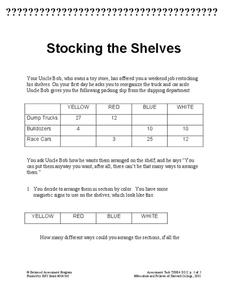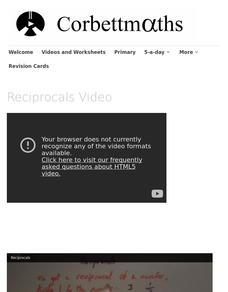Concord Consortium
Stocking the Shelves
How many ways can you stock a shelf? It's probably more than you think! Young scholars use data in a frequency table to determine how many ways to stock a shelf given a specific constraint for types of groups. They then repeat the task...
Illustrative Mathematics
Making 22 Seventeenths in Different Ways
There is more than one way to determine a sum. Scholars demonstrate their understanding of the decomposition of fractions similar to the decomposition of whole numbers. The short task requires pupils to determine which sums of fractions...
Howard Hughes Medical Institute
Classroom Activities: What Is My Carbon Footprint?
Everyone leaves an impression on the world—some more than others. An interactive lesson has learners analyze their lifestyles and the impact they have on the environment. The analysis includes travel, food, and energy categories and ends...
Corbett Maths
Reciprocals
Reciprocals is more than just flipping a fraction. Pupils watch a video to see how to find the reciprocal of any number. Individuals practice finding reciprocals of numbers including whole numbers and decimals.
Constitutional Rights Foundation
The Troubled Elections of 1796 and 1800
Congress does more than create new laws. Political scientists delve into the elections of 1796 and 1800 to understand how political parties, the Electoral College, and personal agendas affected the election process. The resource also...
NASA
Water Works on a Blue Planet
Keep within a water budget. Learners find out that less than 2.5% of Earth's water is available to drink—and that there is a fixed amount of water. Scholars read an interesting article comparing the available water to a game of Monopoly...
Bowland
Hot Under the Collar
It is close enough for all practical purposes. Pupils see two methods to convert degrees Celsius to degrees Fahrenheit, one with exact numbers and another using estimation. Learners review both methods and determine when the estimation...
Flipped Math
Multiply Polynomials
Do not let the distributive property foil you. Individuals hear about the FOIL method to multiply two binomials and how it is nothing more than the distributive property. Pupils learn two methods of multiplying any two polynomials. They...
Health Smart Virginia
What Is It Like to Be You?
Two poems, "What it is like to be you" and "I am more than what you see," provided young scholars an opportunity to reflect on how others see them versus how they see themselves. After reading the poems, individuals write their stories...
Flipped Math
Points, Lines, and Planes
Geometry is more than just vocabulary. Pupils learn the basic geometric definitions and how to identify and name points, lines, and planes. Though the first lesson is packed with related vocabulary, scholars experience four postulates...
Flipped Math
Prove Triangles Similar
Show more than one way to prove similarity. Scholars learn three different methods to show two triangles are similar, Angle-Angle, Side-Side-Side, and Side-Angle-Side. Pupils practice applying these methods to determine whether two given...
Math Mammoth
Customary and Metric Measurement
Through a series of worksheets, mathematicians practice with various concepts of measurement. Conveniently, the 6 pages are easily broken up for individual assignments, and seem to progress in difficulty. Math concepts include drawing...
Curated OER
Ten More or Ten Less
Adding and subtracting 10 is easy once you understand the tricks! Learners first write numbers that are ten more than two double-digit numbers. Then, they find numbers ten less than two other double-digit numbers. An explanation on the...
Curated OER
Relating Fractions and Decimals
Sixth graders identify how fractions and decimals both illustrate parts of a whole. They estimate which number is greater by comparing them to the given fraction and use greater than or less than symbols for each.
Curated OER
Worksheet 35-Spring 1996
For this math worksheet, students sketch six integrals and rewrite the equations as double integrals with reversed integration orders. Students evaluate four integrals. They sketch all points on a coordinate plane when given complex...
Curated OER
Idiom Exercise
Don't let your pupils bite off more than they can chew! Comprehending idiomatic speech can be very perplexing to language learners. Readers must use context clues, common sense, and knowledge of the connotative and denotative meanings to...
Illustrative Mathematics
Log Ride
The rides at a theme park always have limits on weight or number of riders. This makes a natural example of the use of inequalities to solve real-world problems. Learners explore intuitive solutions using substitution to solve the...
Curated OER
Balancing the Books
In this Math worksheet, 7th graders attempt to balance books on the edge of a table. Students pile books on top of each other to extend over the edge by more than half a book length.
Simply Worksheets
Spelling Anagrams
For this spelling worksheet, students look at 15 words and unscramble them so they spell a spelling word or more than one spelling word.
Curated OER
Place Value and Expanded Form
Numbers can take many forms. Learners practice translating one form to another in this place-value worksheet. They start with a word-form number and choose which of six three-digit numbers is less than (the worksheet uses the term below,...
Illustrative Mathematics
A Pencil and a Sticker
How much do a pencil and sticker cost? Youngsters use a bar diagram to find the cost of a sticker that is twenty cents less than the cost of a pencil. Given the prices, learners must find the cost of the sticker in order to find the cost...
Curated OER
Comparing Numbers
In this comparing numbers learning exercise, students apply their math skills as they respond to 18 questions that require them to compare double digit numbers.
Curated OER
Greater Than or Less Than? Single Digits
For this comparing numbers worksheet, learners compare a total of 16 pairs of 1 digit numbers. Worksheet contains a link to additional activities.
Curated OER
Complex Analysis: Graphical Representations
In this graphical representation activity, students draw an Argand diagram depicting complex numbers. They draw in vectors that represent complex numbers. This three-page activity contains approximately ten problems.

























